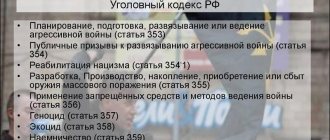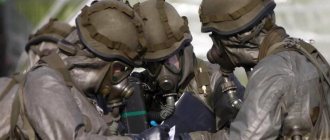There are many different crimes for which liability and punishment are established in the provisions of the Criminal Code of the Russian Federation. Their most dangerous and widespread forms are described in Chapter 34 and they relate to crimes against the peace and security of mankind. Yes, it is with this wording that the legislation of our country considers such acts, and the degree of responsibility for their commission will be discussed in this article.
Responsibility for planning, preparing, initiating or waging aggressive war.
What is a war of aggression?
In Chapter 34, crimes against peace come first - Articles 353 and 354. Art. 353 of the Criminal Code of the Russian Federation is responsible for all aspects of aggressive war. Despite its brevity - the structure includes only two parts, each with only one type of punishment - it reveals a rather serious topic.
A war of aggression, as defined in this specification, is a military encroachment by one state on the territorial and political sovereignty of another. If the UN Security Council considers any action of a country dangerous, then its head will bear responsibility in the appropriate amount.
This chapter describes international crimes, but in a fairly narrow area. If you delve into their essence, it turns out that crimes are committed by individuals or the state itself. Let us clarify that an individual, in the context of an international crime, engages in dangerous political activity and bears responsibility for it.
The following video lecture will introduce you to the concept and features of aggressive war:
Features of the crime
As mentioned, the article is divided into two parts.
- The first is responsible for planning, preparing and unleashing an aggressive war, the second directly for its conduct. As you can see, the first part tries to prevent the implementation of its objects.
- The second provides punishment for the fact of committing a crime.
Concept and legal norms
Let us characterize all the components of Article 353:
- Planning - developing a plan for implementing a military attack;
- Preparation - providing the plan with resources for its implementation (increasing the pace of technology development, increasing the number of weapons, training, etc.);
- The outbreak is the beginning of hostilities that violate the UN Charter.
Sometimes the active force, the ideological leader of an aggressive war is not the first person of the state, but an organized group that acts from the side and remains in the shadows. Pursuing their interests, they hide behind the activities of a certain state, without falling under the main attack.
Composition of the crime and its qualifications
- The objective side is completely filled with three elements of crime - planning, preparation and unleashing.
- But here is a special subject: Head of State;
- Head of the subject;
- Prominent public figure;
- Head of a large commercial company, etc.
Kinds
Aggression may include:
- The offensive of the armed forces of the aggressor country, violation of borders and peace for a period of any duration;
- Blocking points of communication with the outside world (for example, sea and river ports) by military forces;
- Action through a “third party” - provision of territory by a third country to carry out the aggression of the first country on the second;
- Bombing of territories, etc.
The list is approximate; its composition is determined by the UN Security Council; it may depend on the specific situation.
We’ll talk about public calls for unleashing an aggressive war below.
The video below contains even more useful information on the issue of unleashing an aggressive war:
Criminal Code
From international agreements we should move on to the provisions of the current criminal legislation in Russia. Within the framework of the Criminal Code of the Russian Federation there is an article numbered 353, consisting of literally four lines, namely:
- Planning, preparing or unleashing an aggressive war is punishable by imprisonment for a term of seven to fifteen years.
- Waging an aggressive war is punishable by imprisonment for a term of ten to twenty years.
Unfortunately, the concept of “war” is familiar to almost everyone, but the concept of “aggressive war” is not familiar to everyone.
In 1974, Article 1 of UN General Assembly Resolution 3314 (XXIX) clarified this concept, which is as follows: “A war of aggression is the use of armed force by a State against the sovereignty, territorial integrity or political independence of another State, or in any other manner.” inconsistent with the Charter of the United Nations as defined in this definition."
In connection with all of the above, it is worth noting that the objective side of the crime in question consists of three alternative options:
- "Planning". Covers any actions aimed at solving organizational issues necessary to carry out the crime, for example:
- development of plans (strategic, financial, tactical) and instructions;
- determining the timing of military engagements (operations);
- attracting hired staff;
- implementation of deployment activities;
- determination of strike locations, etc.
- "Preparation". In contrast to the above stage, the preparation stage is the most open in nature and the actions carried out in this case are characterized by the following:
- hidden or open increase in the number of troops;
- contraction (redeployment) of combat force to the borders of another state;
- implementation of measures aimed at provoking armed clashes;
- sending sabotage groups;
- acquisition of weapons and equipment, including those intended for mass destruction of manpower.
- "Untying" In the previously mentioned Resolution 3314, Article 3 provides a rather redundant explanation of the actions that qualify as this stage:
- an invasion or attack by the armed forces of one state on the territory of another state or any military occupation. At the same time, the time intervals of these events are not of key importance;
- any form of annexation of the territory of the defending state;
- bombing by the armed forces of a state of the territory of another state or the use of any weapons by one state against the territory of another state;
- blockade of ports and coasts of a state by the armed forces of another state; an attack by the armed forces of one state on the land, sea or air forces and fleets of another state;
- an attack by the armed forces of one state on the land, sea or air forces and fleets of another state; the use of the armed forces of one state located on the territory of another state in violation of the conditions provided for in the agreement, or the continuation of stay after the termination of the agreement;
- provision by a state of territory to another state for committing aggression against a third state;
- dispatch by the state or on behalf of the state of armed bands, groups, irregular forces or mercenaries who carry out acts of use of armed force against another state that are tantamount to armed aggression.
- "Leading". This stage, in fact, is a direct continuation of the outbreak of an aggressive war.
Accordingly, the above list is not exhaustive and other acts of aggression may also be included.
The composition of part 2 presupposes the continuity of the commission of the crime in question. For persons who did not participate in the acts provided for in Part 1, these provisions are qualified as an independent crime, and for those who directly participated in the planning, preparation and outbreak of war, they are considered as a qualifying feature. Of course, ordinary ordinary citizens cannot declare war on another state, which creates the presence of a special subject in the above provisions. They can only be persons who are vested with the constitutional right to resolve such issues, and the list of positions and available powers is established:
Federal Law dated May 27, 2003 N 58-FZ “On the civil service system of the Russian Federation”, Decrees of the President of the Russian Federation dated January 11, 1995 N 32 “On public positions of the Russian Federation”, as well as Federal Law dated December 31, 2005 N 1574 “On the Register of Federal Positions” state civil service.
Calls for a war of aggression
Not only direct aggression can disrupt peace. Creating tension, agitation, and “charging” the population or other people with a negative mood should also be limited so as not to lead to tragedy in the future.
Concept and legal norms
The essence of the crime is the public influence of a person on an unspecified audience with the aim of unleashing aggression and war. It is necessary to distinguish incitement from public calls - it is in the uncertainty of the audience and the lack of direction of calls that a different structure of the crime lies.
The punishment is prescribed by Art. 354 of the Criminal Code of the Russian Federation, which regulates the violation of peace in our country. In general terms, public calls for war are contrary to the International Covenant on Civil and Political Rights.
Calls are considered public when there are large crowds of people, or if they can receive information remotely:
- Rally;
- Lecture;
- Meeting;
- Widespread handouts;
- Literature;
- Media, etc.
Composition of the crime and its qualifications
- The object of the crime and the subjective side are completely duplicated from Article 353.
- The subject of this article is general - a sane person over the age of 16 years. Let us only note that, unlike incitement, there cannot be accomplices.
This crime is qualified by two criteria:
- Application of media;
- Subject – a government position of the Russian Federation or its subject.
Kinds
Most often, several types of actions act as a call; they can be divided into groups:
- Violation of state secrets;
- Direct call;
- Dissemination through computer technology and the media of materials falling under Article 354;
- Declassification of information about counterterrorism operations.
General provisions
Due to the fact that war involves the conduct of large-scale military operations that cover more than one state, the object of this crime is the peaceful coexistence of states. Since it was already mentioned above that war always has large-scale consequences, there are many international legal acts condemning such acts and establishing responsibility for their commission. One such act is the Kellogg-Briand Pact, also better known as the Paris Pact.
In August 1928, French Foreign Minister Aristide Briand and US Secretary of State Frank Billings Kellogg signed this pact, establishing treaty obligations to renounce military action as a tool/tool for solving national politics. The “Paris Pact” was signed on August 27 by representatives of 15 states, which were later joined by all other active countries. After which many more agreements, pacts, codes and other documents were concluded on mutual non-aggression, the inadmissibility of aggression, etc.
But, as is known from subsequent history, no international treaties and agreements ensure the safety and fulfillment of the obligations achieved.
Punishment and responsibility
| Part | Article 353 | Article 354 |
| First part | Imprisonment 7-15 years | Fine up to 300 thousand rubles, imprisonment up to three years |
| Second part | Imprisonment 10-20 years | Fine up to 500,000 rubles, also imprisonment for five years without the right to work in a certain position for up to three years |
Wars of aggression have been fought since ancient times, when Russia did not yet exist. But today we are civilized nations, which means such a crime is unacceptable.










